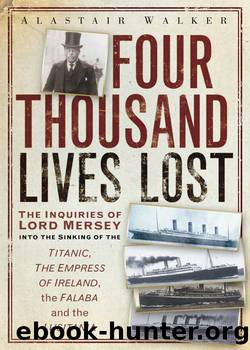Four Thousand Lives Lost by Alastair Walker

Author:Alastair Walker
Language: eng
Format: epub
ISBN: 9780752467832
Publisher: The History Press
Published: 2012-02-08T00:00:00+00:00
10
E.J. SMITH
The British inquiry into the loss of the Titanic lasted from 2 May 1912 to 3 July with sittings on 37 days during that period at two different venues. The report was read by Mersey at a final session on 30 July. By any standards it was a long and detailed inquiry at which a total of 97 witnesses gave evidence. The cast list was impressive, with the Attorney General Sir Rufus Isaacs appearing for the Board of Trade and Butler Aspinall KC for the government. We have already mentioned the Marconi connections of the former and the fact that his client, the Board of Trade, was the sponsoring department of government for the inquiry. Butler Aspinall was to be almost as much of a fixture in these inquiries as Mersey himself, appearing for Canadian Pacific in the Empress inquiry, for Elder Dempster in the Falaba inquiry and for Cunard in the Lusitania one.
We touched on the possible impact on the Falaba inquiry of the timing of the sinking of Lusitania. In the case of the Titanic we need to be aware of the timing of the American Senate hearings as they preceded the British inquiry and attracted considerable publicity on both sides of the Atlantic. The Senate Sub-Committee began to hear witnesses on Friday 19 April, just four days after the tragedy and completed its sessions on Saturday 25 May. Its final report was issued just three days later on 28 May. There was, therefore, quite a long period of overlap as both inquiries heard testimony. Because almost all of the witnesses were in America at the start of the process, the pattern was almost always that those who testified at both appeared first in front of the Senators. Not all who appeared at one testified at the other; the American inquiry had much more evidence from passengers, for example, than Mersey heard. It is impossible to gauge the extent to which the evidence given at the sessions in New York exerted an influence on any of those taking part in the ones in London. It may be that Mersey himself or the lawyers representing the different interests were prompted by what they knew of the proceedings in America to ask some additional questions. Bruce Ismay, of White Star, amongst others, was questioned by the Attorney General on differences between his answer to a question in New York and his answer to the same question in London. In one case he had quoted Chief Engineer Bell as saying that he âthoughtâ the pumps would cope with the inflow of water while in the other he had used the word âhopedâ. Rufus Isaacs thought that the difference might have been significant; Ismay blamed it on his unreliable memory. When we come to consider how the Californian incident was dealt with, however, the overlap might be thought to have impinged on more than quibbles about words.
The American and British press not only reported the proceedings of the two inquiries, they also commented on their very different styles and approaches.
Download
This site does not store any files on its server. We only index and link to content provided by other sites. Please contact the content providers to delete copyright contents if any and email us, we'll remove relevant links or contents immediately.
| Automotive | Engineering |
| Transportation |
Small Unmanned Fixed-wing Aircraft Design by Andrew J. Keane Andras Sobester James P. Scanlan & András Sóbester & James P. Scanlan(32155)
Navigation and Map Reading by K Andrew(4568)
Endurance: Shackleton's Incredible Voyage by Alfred Lansing(3866)
Wild Ride by Adam Lashinsky(1663)
And the Band Played On by Randy Shilts(1630)
The Box by Marc Levinson(1605)
Top 10 Prague (EYEWITNESS TOP 10 TRAVEL GUIDES) by DK(1574)
The Race for Hitler's X-Planes: Britain's 1945 Mission to Capture Secret Luftwaffe Technology by John Christopher(1533)
The One Percenter Encyclopedia by Bill Hayes(1473)
Girls Auto Clinic Glove Box Guide by Patrice Banks(1373)
Trans-Siberian Railway by Lonely Planet(1352)
Looking for a Ship by John McPhee(1327)
Batavia's Graveyard by Mike Dash(1308)
Fighting Hitler's Jets: The Extraordinary Story of the American Airmen Who Beat the Luftwaffe and Defeated Nazi Germany by Robert F. Dorr(1307)
Troubleshooting and Repair of Diesel Engines by Paul Dempsey(1290)
Bligh by Rob Mundle(1279)
TWA 800 by Jack Cashill(1257)
The Great Halifax Explosion by John U. Bacon(1234)
Ticket to Ride by Tom Chesshyre(1234)
